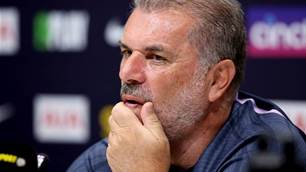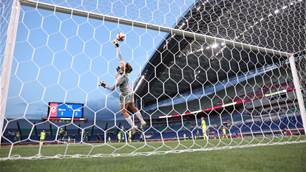WITH his double winners still scoring for fun, it's no wonder Carlo Ancelotti loves life in England. FourFourTwo pulls up a pew with the Chelsea boss to talk tactics, Capello and playing 'Playstation football'.
It was May 2008 when Carlo Ancelotti found himself in the back of a Parisian taxi, checking the rearview mirror as he hurtled towards the George V hotel near the Champs-Elysees for a clandestine meeting with Roman Abramovich. Once his initial thoughts of feeling like an Italian James Bond had subsided, Ancelotti would note the Russian's timid demeanour, but also his immense hunger for success. "I want to win everything," Abramovich told him.
Fast-forward just over two years and the setting is Chelsea's leafy training ground in Cobham. It's not quite a Blofeld-like secret bunker, but it's an impressively high-tech complex nonetheless, befitting of England's Double winners. In fact, this time it's FFT who feels like the secret agent, being ushered through security into a fixtureless side room to wait for the 51-year-old while he finishes conducting a light training session.
It's the afternoon of the Champions League draw and the atmosphere around ?the training ground is thick with anticipation: the news that Abramovich has called to say he's about to visit only adds to the drama. But when Ancelotti arrives, he's calmness personified. It's an attitude he picked up from Nils Liedholm, the legendary Swede - nicknamed 'The Baron' - who signed Ancelotti from Parma on his way back from a holiday with his wife, and made him an integral part of Roma's title-winning side in 1983. Liedholm famously used to sleep on the train in a private carriage before big away matches - indeed, his players lived in fear that he might wake up in Amsterdam after they had already got off in Milan. "The first thing I learned from him was how to be calm and collected at all times," Ancelotti says. "To have patience and common sense."
That natural unflappability comes from having won everything at club level. In Italy he lifted the Champions League four times with Milan: twice as a player and twice as manager. It's incredible to think that just over a decade ago, Juventus fans, dubious about their new boss, unveiled a banner reading 'A pig can't coach' - a reference to Ancelotti's farming background. But his management style was far from agricultural, and just a few years later he was one of the most coveted coaches in football.
A year on since our last meeting, it doesn't really come as a shock that Ancelotti has already tasted success at Stamford Bridge. The surprise lies in the fact it came so quickly in the league: he'd only won one league title before in his coaching career, and experienced numerous heartbreakingly close calls - like in Perugia in 2000 when his Juventus side, driven by Zinedine Zidane, lost the title to Lazio on the final day of the campaign.
The Italian version of Ancelotti's autobiography was amusingly entitled Preferisco La Coppa ?['I Prefer the Cup'], leaving no one under any illusion as to the hex the league held over him. But after bagging it here in his first season, one wonders if he's changed his mind. "It's hard to say which trophy you'd prefer to win because, at the end of the day, every win is important," he muses. "Outside of the league, there's a lot of satisfaction in winning the Champions League, and I'd like to win that here as well.
"The key in my opinion was the fact that I already knew this team really well. I got to know the club and I trusted its good organisation," he adds. "I didn't want to change anything that was good about the club. I looked to integrate myself and exploit the many qualities on a technical and organisational level, and naturally I tried to bring my experience to the club."
In that sense, Ancelotti is the archetypal pragmatic Italian tactician. That's not to tar him with the negative brush of catenaccio, but to exalt his qualities as a stock-taker capable of understanding what it takes to make a team win. Unlike the Brian Clough seen in David Peace's The Damned United, who wanted to change everything about Don Revie's Leeds side, Ancelotti demonstrated restraint, resisting the temptation to rip up what was best from theMourinho and Hiddink eras at Chelsea.
He retained the spine of the team and even its 4-3-3 formation after a brief experiment with a diamond in midfield. But whereas Mourinho's Chelsea set a Premier League record for fewest goals conceded in a season (15), Ancelotti's would break one for most scored (103). On an aesthetic level, he'd achieved at Chelsea what Clough wanted to do but never actually did at Leeds. In Old Big 'Ed's words, he's made a team play the right way and won the league better.
"There's no such thing as a winning or losing formation," Ancelotti claims. "A manager can only create a system based on his players' characteristics. It's fashionable at the moment to play with a striker, two wingers, a playmaker in the hole and two holding midfielders. If the characteristics of my players lent themselves to playing like this, I'd play them this way."
The sudden emergence of Florent Malouda as one of Chelsea's key players - a "PlayStation footballer" as Ancelotti calls him - after two underwhelming seasons at Stamford Bridge ?is testament to this simple piece of common sense. "I've tried to play him in the position that's most natural to him," Ancelotti explains. "He's always played on the left wing and I've tried to keep him there, where his skills can be best put at the service of the team."
Malouda has picked up where he left off last season, scoring four times in Chelsea's opening three league games, which in turn persuaded Laurent Blanc to make him France's captain ?for their first Euro 2012 qualifiers, capping a remarkable turnaround in a career that looked to have stalled in west London. Malouda has fast become a symbol of Ancelotti's Blues and their counter-attacking game, the beauty of which lies in its swift ruthlessness.
Speaking after Chelsea demolished both West Brom and Wigan 6-0 in their first two games of the new campaign (taking the team's goal tally to an astonishing 29 in five league matches), Malouda said: "Even when we finished top, people still said Arsenal played better than us. It's difficult to know why people think that Arsenal play the better football."
The answer perhaps lies in the abiding memory Mourinho left of a Chelsea side that was impressive in its brute force but not always in its elegance, grinding out no fewer than 11 1-0 victories in the 2004-05 season alone. That perception is virtually set in stone, and it's proving difficult to shift, considering players synonymous with that era like Terry, Drogba and Lampard remain at the club.
"Everyone says we're physical," Ancelotti admits. "But we play good football, too. There are excellent individuals here with great qualities - exceptional ones, even. For example, Essien is considered a physical player, but he has the same quality in terms of talent as Drogba or Lampard. We receive credit in the sense that the figures tell us we scored more than 100 goals last season, so that must mean the team did well offensively. Rather than physical, I'd say it's a very powerful team."
Of course, steamrollering the opposition so often, as 6-0, 7-1 and 8-0 scorelines suggest, also raises questions regarding the level of competition in the Premier League and whether it's in decline. "I wouldn't say it's lower," he says. "There are five or so teams that could seriously think about winning the league at the start of the season. I don't think there's another league in the world where that's the case.
"Then there are the smaller clubs, who even when they're losing try to stay in the game, ?to do whatever they can to get a result. And that's part of English football culture.
"In Italy, it's impossible," he adds. "Winning 6-0 would be impossible, because even if they're losing, the Italian teams will still maintain a defensive shape. And this is part of Italian football culture."
It's telling that Ancelotti buys into the stereotype of Italian football, considering he's done as much as anyone to help change it. He was the coach who established a reputation at Parma for being 'anti-fantasy' after he sold Gianfranco Zola to Chelsea and turned down the chance to sign Roberto Baggio - only to then start with three fantasisti in Manuel Rui Costa, Andrea Pirlo and Clarence Seedorf at Milan.
Related Articles

Postecoglou looking to A-League to 'develop young talent'
.jpeg&h=172&w=306&c=1&s=1)
Big change set to give Socceroos star new lease on life in the EPL













